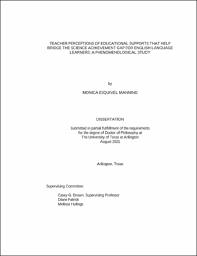
ATTENTION: The works hosted here are being migrated to a new repository that will consolidate resources, improve discoverability, and better show UTA's research impact on the global community. We will update authors as the migration progresses. Please see MavMatrix for more information.
Show simple item record
| dc.contributor.advisor | Brown, Casey G | |
| dc.creator | Manning, Monica Esquivel | |
| dc.date.accessioned | 2021-09-14T16:38:07Z | |
| dc.date.available | 2021-09-14T16:38:07Z | |
| dc.date.created | 2021-08 | |
| dc.date.issued | 2021-08-16 | |
| dc.date.submitted | August 2021 | |
| dc.identifier.uri | http://hdl.handle.net/10106/30032 | |
| dc.description.abstract | English language learner (ELL) students account for 19.6% of the Texas public school system (Texas Education Agency, 2019). National and state assessment data showed a learning gap between ELL students and their non-ELL counterparts, specifically in science (Texas Education Agency, 2017a; United States Department of Education, 2015). This qualitative study was conducted to examine how teachers of ELL students in a dual language program perceived the educational supports they received affected student achievement in science. The teachers who were interviewed had worked diligently to reduce the achievement gap in science.
Using social cognitive theory as a theoretical framework, I explored how teachers perceived educational supports affected student achievement in science. Teacher participants were asked about their experiences with instructional and administrative supports as well as professional developments they attended and how those supports affected their teaching and student performance. Two administrators also were interviewed for the research study. I attempted to discover the factors that teachers perceived helped their students achieve passing results in science.
Three themes resulted from the data findings. The three themes included vocabulary instruction, visuals, and hands-on activities as integral to student achievement; strategies learned in professional developments (including non-science-based training) in their science classrooms; and administrators focused on resource allocation and alignment so that teachers could focus on student learning. Instructional supports including building vocabulary, first language knowledge, and providing resources were identified as essential to student achievement. Many participants who attended non-science content professional development applied the strategies learned there to their science classrooms. | |
| dc.format.mimetype | application/pdf | |
| dc.language.iso | en_US | |
| dc.subject | ELL | |
| dc.subject | Dual language | |
| dc.subject | Science | |
| dc.subject | professional development | |
| dc.subject | Instructional supports | |
| dc.subject | Administrative supports | |
| dc.title | TEACHER PERCEPTIONS OF EDUCATIONAL SUPPORTS THAT HELP BRIDGE THE SCIENCE ACHIEVEMENT GAP FOR ENGLISH LANGUAGE LEARNERS: A PHENOMENOLOGICAL STUDY | |
| dc.type | Thesis | |
| dc.contributor.committeeMember | Brown, Casey | |
| dc.degree.department | Educational Leadership and Policy Studies | |
| dc.degree.name | Doctor of Philosophy in Educational Leadership and Policy Studies | |
| dc.date.updated | 2021-09-14T16:38:08Z | |
| thesis.degree.department | Educational Leadership and Policy Studies | |
| thesis.degree.grantor | The University of Texas at Arlington | |
| thesis.degree.level | Doctoral | |
| thesis.degree.name | Doctor of Philosophy in Educational Leadership and Policy Studies | |
| dc.type.material | text | |
| dc.creator.orcid | 0000-0002-9841-9752 | |
Files in this item
- Name:
- MANNING-DISSERTATION-2021.pdf
- Size:
- 719.0Kb
- Format:
- PDF
This item appears in the following Collection(s)
Show simple item record


